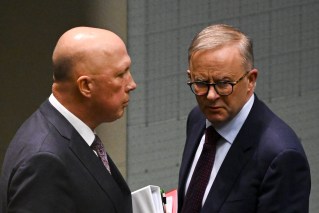Ardern, Albo ask Pacific neighbours to help host UN climate summit
Australia and New Zealand will ask Pacific island nations to be part of a joint bid to host a future United Nations climate summit.

New Zealand Prime Minister Jacinda Ardern and Australian Prime Minister Anthony Albanese at the Australia-New Zealand Leadership Forum Dinner in Sydney last year. (AAP Image/Dean Lewins)
Prime Minister Anthony Albanese and NZ leader Jacinda Ardern discussed the proposal at a meeting in Sydney on Friday, ahead of their attendance at next week’s Pacific Islands Forum in Fiji.
The invitation comes as a group of esteemed Pacific leaders has urged Australia to show support for the region by abandoning plans for new fossil fuel generation.
Serving Pacific leaders have been clear with their disappointment with Australian efforts to combat climate change.
In December last year, Fiji Prime Minister Frank Bainimarama said Australia had a “dangerous addiction to coal” before welcoming Mr Albanese’s election, hoping he would “put the climate first”.
Past leaders are also adding their shoulder to the regional effort.
Former leaders from Tuvalu, Kiribati, Marshall Islands and Palau have co-signed a statement asking countries to improve their emissions-cutting effort.
“The latest assessments are clear: global emissions must be halved during this decade. There is no room for new coal and gas,” the statement said.
Albanese said jointly hosting the UN Conference of the Parties was an important step in engagement on climate in the Pacific.
He told reporters in Sydney that Australia’s new emissions reduction target of 43 per cent of 2005 levels by 2030 was a “floor”.
“Australia is now a participant in the constructive action that is required globally to deal with the challenge of climate change,” he said.
He noted Australia’s $200 million fund for infrastructure investment in climate change, on top of the $525 million in development assistance in the Pacific.
“I believe that our changed position (on emissions) will be very much welcomed in the Pacific.”
Ardern said NZ had increased its UN commitment to a 50 per cent emissions cut and had “zero carbon” legislation and goals.
“With our commitments in the Pacific we’ve increased climate financing to $1.3 billion and at least 50 per cent of that into the region.
“We want to continue to up our game in the region and that’s what the Pacific are looking for.”
Mr Albanese said he also wanted to discuss security arrangements in the region, as China seeks bilateral deals with Pacific nations.
“We know we are living in an era of strategic competition in the region.
“Australia’s friendship and relations with sovereign nations of the Pacific are ones of a friend …(and) a security partner of choice.”
Meanwhile, Pacific elders – including Enele Sopoaga of Tuvalu, the 2019 PIF chair, Anote Tong of Kiribati, Hilda Heine of Marshall Islands and Palau’s Tommy Remengesau – have endorsed a new report from Australia’s Climate Council, released on Friday.
Lead author Wesley Morgan said a failure to adopt climate pledges in line with what would restrict global warming to 1.5C would hit Australia’s standing in the Pacific.
“Australia’s failure to act on climate change undermined our national security – nowhere is that more evident than the Pacific,” he said.
“The Pacific Islands Forum is a crucial moment for the Albanese government to reset relations with strategically important Pacific nations, and prove itself as a climate leader.
“Australia will need to show Pacific countries that it is serious about climate action, both by cutting emissions at home and working with the rest of the Pacific to drive global cuts in emissions this decade.”
The report makes plain the disastrous efforts for the Pacific without a course correction on emissions.
At current warming trends, the blue continent will endure more destructive cyclones, coastal flooding, the loss of 99 per cent of coral reefs, all of which will hit food and water security and precarious economies.
“The latest science strongly affirms what Pacific island countries and communities have long known: that climate change is the single greatest threat to their future,” Dr Morgan writes.
The Pacific elders put it more bluntly, saying low-lying states are at risk of “annihilation”.












